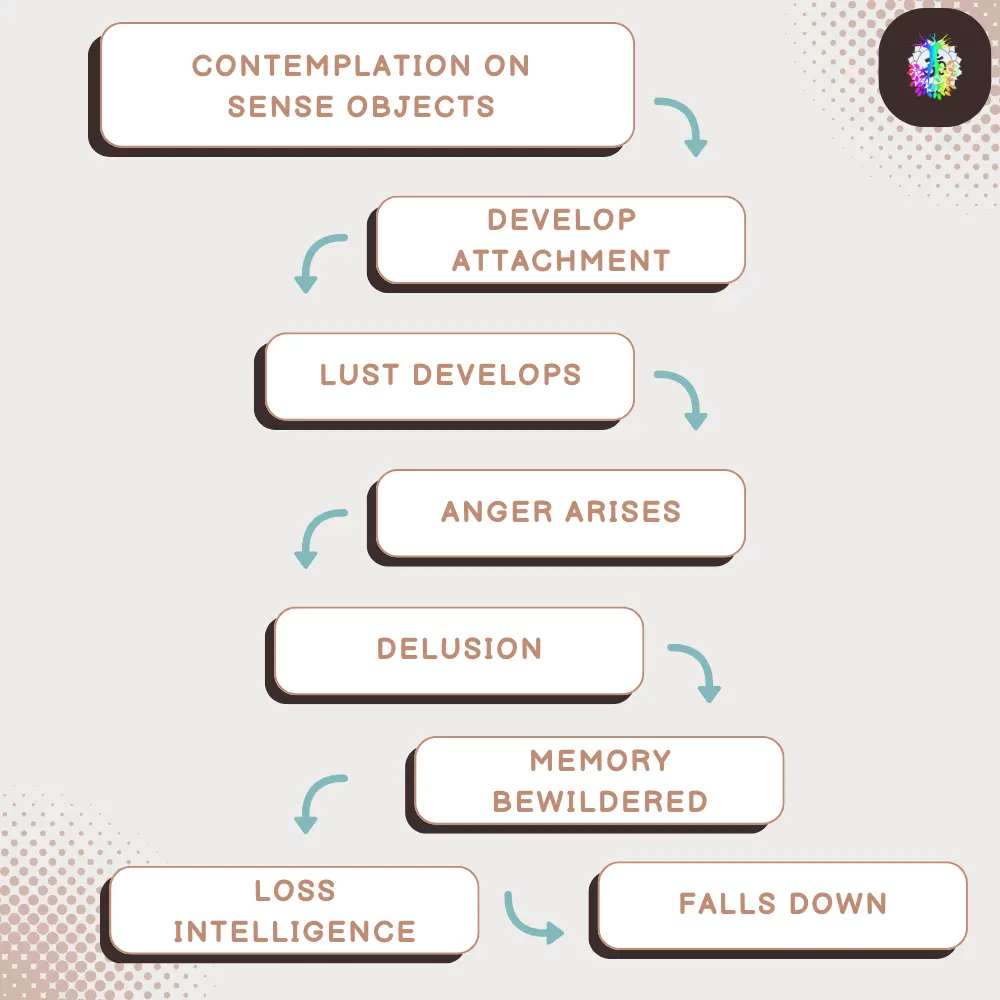सञ्जय उवाच
तं तथा कृपयाविष्टमश्रुपूर्णाकुलेक्षणम् ।
विषीदन्तमिदं वाक्यमुवाच मधुसूदनः ॥१॥
Chapter’s Name: Sankhya Yoga (Knowledge of the Self)
In this chapter, when the surrendered Arjuna asked Lord Krishna the solitary means of relieving his grief, the Lord first described the “Atma-tattva” (knowledge of the self) up to the 30th verse. Hearing, contemplating, and meditating on the Self is the core of Sankhya Yoga. Although this chapter also explains the nature of karma yoga by describing Svadharma after the 30th verse, the teaching begins with Sankhya Yoga. It describes the Self in more detail here than in other chapters. For this reason, this chapter is named “Sankhya Yoga“
Beyond Life and Death: Discovering the Soul’s Eternal Journey
Giving importance to one’s discretion and performing one’s duty – if a person uses any of these measures firmly, then sorrow and worry disappear.
All the bodies that we see are perishable, they are going to die, but the one who lives in them never dies. Just as the body leaves childhood and takes on youth and youth leaves youth and old age, similarly the one living in the body leaves one body and takes on another body.
Just as a person leaves old clothes and wears new clothes, the one living in the body leaves one body and wears another.
All the favorable and unfavorable circumstances that come, they were not there before and will not be there in the past either and in between also, there is separation from them every moment. It means that those circumstances are going to come and go, they are not going to remain forever.
In this way, if there is clear discretion, there is no turmoil, sorrow, or worry. Whatever duty is received as per the instruction of scriptures, if it is performed by remaining equipoised in completion or non-completion of the task and attainment or non-attainment of the result, then there will be no disturbance.
Bhagavad Gita Chapter 2 Summary Verse Wise
Verse 1: Sanjaya has described Arjuna’s sorrow.
Verses 2-3: Lord Krishna has condemned Arjuna’s attachment and sorrow full of work and encouraged him for the war.
Verses 4-5: Arjuna has said that it is better to live by alms than to kill respected teachers like Bhishma-Drona.
Verse 6: Having doubts about fighting or not fighting the war,
Verse 7: Describing the defects of attachment and cowardice, he has taken refuge in God and prayed to him for good advice.
Verse 8: He has shown the feeling of detachment by not considering the trouble-free kingdom of Triloki as a reason for getting rid of grief.
Verses 9-10: Sanjaya has told Arjuna to remain silent after asking him not to fight the war and God smilingly spoke to him.
Verse 11: Bhagwan started preaching
Verses 12-13: He explained the eternity and unchangeability of the soul

Verse 14: He said that all pleasures are temporary and asked to tolerate dualities like happiness and sorrow
Verse 15: He said that tolerating these things is the reason for attaining salvation
Verse 16: He explained the characteristics of true and false things
Verses 17-18: He told the nature of true and false things and ordered Arjun to fight
Verse 19: He said that those who kill or die the soul are ignorant
Verse 20: He described the nature of the soul as devoid of six disorders like birth etc.
Verse 21: He proved that the one who knows the soul element does not become the one who kills or gets anyone killed
Verse 22: He explained the principle of changing bodies by giving the example of a man changing his clothes
Verses 23-25: The soul is indistinguishable, incombustible, unchangeable, and indestructible, as well as eternal, omnipresent, permanent, immovable, everlasting, unexpressed, unthinkable, and formless, and it has been proved inappropriate to grieve for it.

Verses 26-28: Even though the soul is considered to be born and die, it is also said to be inappropriate to grieve for it due to the transience of the body.
Verse 29: The rarity of those who perceive, articulate, and comprehend the essence of the soul is emphasized.
Verse 30: The soul element being completely indestructible, it is proved inappropriate to grieve for any living being.
Verses 31-36: From the viewpoint of Kshatriya Dharm, by declaring war as Arjuna’s svadharma, he has proved it inappropriate in every way to renounce it.
Verse 37: By declaring war as beneficial in this world as well as the next, he has ordered Arjuna to prepare for the war.
Verse 38: By declaring equanimity as the means of remaining detached from sins in actions like war etc.
Verse 39: By introducing the description of the intellect related to Karmayog which cuts the bondage of karma, he has given a proposal.
Verse 40: The glory of Karmayog has been described.
Verse 41: The difference between the intellects of the determined and the non-decisive people has been described.
Verses 42-44: The nature of sakaam manushya (people who do vedic practices to get material results) who are devoted to heaven has been described.
Verse 45: Arjuna has been told to be selfless, free from conflict, in a pure state of spiritual existence, one who does not desire anything for the welfare of the world and to be self-controlled
Verse 46: For a Brahmin, the Vedas have described the enjoyment of pleasures as the result of karma as useless.
Verse 47: The nature of Karmayoga has been explained.
Verse 48: Equanimity is the definition of yoga.
Verse 49: Compared to equanimity, fruitful actions have been described as extremely insignificant and those seeking results have been described as extremely miserable.
Verses 50-51: After praising the Karma-yogi with balanced intellect, Arjuna is instructed to engage in Karmayog and the result of equanimity is the attainment of the state of Anamaya (without miseries)
Verses 52-53: The Lord has told him that when the intellect becomes pure, clean, and clear with detachment, one can attain God.
Verse 54: Arjuna has asked four questions about a man of steady intellect.
Verse 55: He has answered the first question.
Verses 56-57: He has answered the second question.
Verse 58: He has answered the third question in a sutra form.
Verses 55-58: Absence of all desires, not expecting external means and always being satisfied within oneself, not being perturbed by sorrows, not having any desire for happiness, a total absence of attachment, fear, and anger, joy and sorrow on receiving good and bad things and the characteristics of a man of steady intellect have been described as absence of attachment and aversion and keeping all the senses under control by keeping them away from objects.
Verse 59: Even if the senses are removed by not accepting objects, attachment does not go away; it goes away only by seeing God.
Verse 60: The power of the senses has been described.
Verse 61: The man who has conquered the senses has been praised by asking him to be devoted to God with restraint of the mind and the senses.
Verses 62-63: The sequence of downfall due to thinking about objects has been described.

Verses 64-65: It has been said that those who perform their duties without attachment and aversion receive blessings, all sorrows are destroyed by it and their intellect soon becomes steady.
Verse 66: The absence of superior intellect, God-thought, peace, and happiness has been shown for the unrighteous man.
Verse 67: With the example of wind and boat, the senses have been described as taking away the intellect due to the association of the mind.
Verse 68: It has been proved that the one who has his senses under control has a stable intellect.
Verse 69: For ordinary people, spiritual bliss is like night, and for a Yogi who knows the truth, sensual pleasure is like night.
Verse 70: With the example of the ocean, the great wise man has been glorified.
Verse 71: It has been said that the men who move around without all desires, longings, attachments, and ego attain supreme peace.
Verse 72: The chapter has been concluded by describing the greatness of that spiritual state.
एषा ब्राह्मी स्थितिःपार्थ नैनां प्राप्य विमुह्यति ।
स्थित्वास्यामन्तकालेऽपि ब्रह्मनिर्वाणमृच्छति ॥७२॥
Read Bhagavad Gita Chapter 2 Online on Vedabase
With over three years of dedicated experience in studying and researching Indian scriptures, the author is passionate about sharing the profound wisdom of texts like the Bhagavad Gita, Puranas, and Upanishads. Through in-depth exploration of authentic commentaries, such as those by Gita Press, combined with thoughtful online research, the insights provided are both accurate and engaging.



